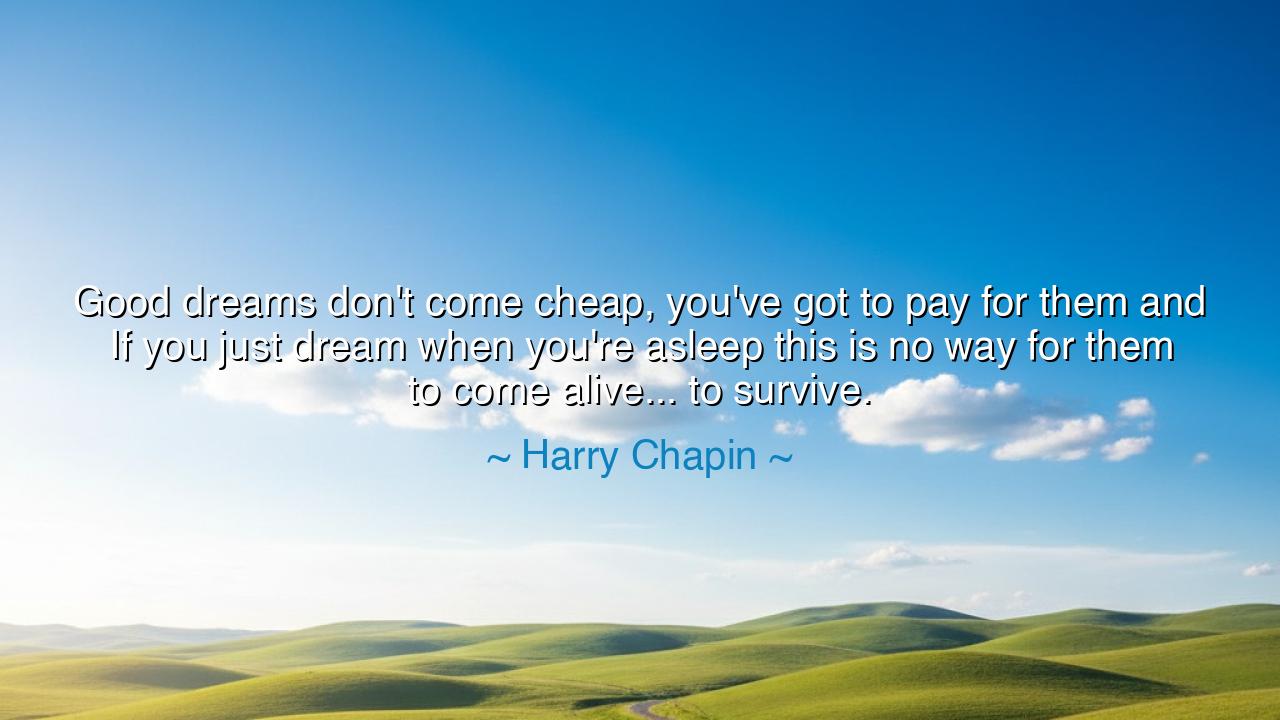
Good dreams don't come cheap, you've got to pay for them and If
Good dreams don't come cheap, you've got to pay for them and If you just dream when you're asleep this is no way for them to come alive... to survive.






The Price of Dreams and the Labor of the Soul
In the voice of the troubadour Harry Chapin, singer of stories and weaver of wisdom, there resounds a timeless truth: “Good dreams don’t come cheap, you’ve got to pay for them, and if you just dream when you’re asleep, this is no way for them to come alive… to survive.” These words are not merely lyrics from a song—they are a call to awaken, a reminder that the realm of dreams belongs not only to the sleeping, but to those who rise from slumber to make them real. For dreams, like seeds, perish without labor; and only through the sweat of purpose do they take root and bloom.
The origin of this quote lies in Chapin’s lifelong devotion to his art and his humanity. A poet of compassion, he sang of the common man—the truck driver, the failed musician, the lost dreamer—all those who struggled between who they were and who they wished to be. His songs, such as “Cat’s in the Cradle” and “Taxi”, were not mere melodies but mirrors, reflecting both the beauty and the tragedy of human longing. When he spoke of paying for dreams, he did not mean with gold or fame, but with effort, discipline, and sacrifice. He knew that to bring a dream into the world is to wrestle it from the heavens and breathe life into it through toil.
Chapin himself lived this truth. He dreamed not only of music, but of a world without hunger. Though already a celebrated musician, he gave much of his wealth and time to humanitarian causes, founding World Hunger Year to fight poverty across the globe. He died young, but his dream did not die with him—it survived because it had been paid for in full, with love, sweat, and action. His life reminds us that the cost of greatness is not measured in comfort, but in courage.
The ancients too spoke of this sacred exchange. In the myths of Greece, Daedalus, the master craftsman, built wings for himself and his son to escape captivity. But those wings, symbols of invention and aspiration, were not gifts of the gods—they were forged by human hands, shaped through pain and patience. They were the price of freedom, just as Chapin’s “good dreams” are the price of fulfillment. Yet even Daedalus’s joy was tempered by sorrow when his son, Icarus, flew too close to the sun, forgetting the humility required of dreamers. Thus, the old lesson stands: every dream demands both ambition and discipline, daring and wisdom in equal measure.
When Chapin warns that dreaming only in sleep is “no way for them to come alive,” he speaks to the danger of passive hope. Many are those who dream of love, success, or justice, but few are those who rise to build them. A dream without action is a ghost—it visits the heart at night, but fades with the dawn. The builder, the artist, the reformer—these are the ones who dream with open eyes, who shape the invisible into the tangible. To them, failure is not an end but a passage, for they understand that the dream lives not in perfection, but in persistence.
There is a story from the life of Thomas Edison, who was asked how he endured thousands of failures before creating the light bulb. He replied, “I did not fail. I found a thousand ways that did not work.” In his words lives the same spirit as Chapin’s: that good dreams don’t come cheap. Each failure was a payment, each disappointment a small price in the greater purchase of illumination. The light of our world today is proof that persistence can make even the most fragile dream immortal.
So, my children of vision, hear this: do not dream cheaply. Let your sleep inspire you, but let your waking hours build what you see in your heart. Work until your hands know the shape of your purpose. If the road is long, walk it; if it is hard, climb it; if it is lonely, sing upon it. For no dream worth keeping is born without effort, and no dream worth loving is realized without endurance. The dream that is paid for becomes a part of your soul—it lives beyond you, it survives.
And remember the wisdom of Harry Chapin: the world belongs not to those who dream easily, but to those who pay the price of bringing those dreams to life. Let your work be your song, your persistence your prayer, and your life the proof that dreams, when labored for, can indeed come alive—and live forever.






AAdministratorAdministrator
Welcome, honored guests. Please leave a comment, we will respond soon